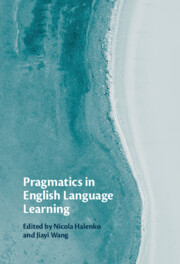1 - Second Language Pragmatics
A Historical Overview and Future Directions
Published online by Cambridge University Press: 29 September 2022
Summary
Over the last four decades, research in second language (L2) pragmatics has grown rapidly in its scope, quality, and amount of empirical investigations. This chapter surveys historical developments of L2 pragmatics research from the 1980s up to now. The chapter discusses a range of topics including definitions of pragmatic competence, models of pragmatic competence and development, and theoretical underpinnings of pragmatics learning. Specific topics such as instruction and assessment, longitudinal investigation into pragmatic development, and contexts of pragmatics learning (i.e., study abroad) are also discussed. Research areas that emerged with the recent surge of globalisation and advancements in technology are presented with a discussion on how these new areas have advanced our investigation of pragmatics learning and development. The chapter concludes with directions for future research.
Keywords
- Type
- Chapter
- Information
- Pragmatics in English Language Learning , pp. 7 - 26Publisher: Cambridge University PressPrint publication year: 2022
References
- 3
- Cited by

